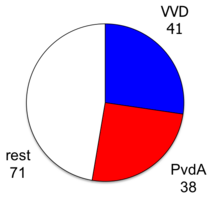The second Rutte cabinet, also called the Rutte–Asscher cabinet, was the executive branch of the Government of the Netherlands from 5 November 2012 until 26 October 2017. The cabinet was formed by the conservative-liberal People's Party for Freedom and Democracy (VVD) and the social-democratic Labour Party (PvdA) after the election of 2012. The cabinet was a centrist grand coalition and had a slim majority in the House of Representatives. VVD Leader Mark Rutte served as Prime Minister; prominent PvdA politician Lodewijk Asscher, a former alderman of Amsterdam, served as Deputy Prime Minister and Minister of Social Affairs and Employment.
Second Rutte cabinet Rutte–Asscher cabinet | |
|---|---|
Cabinet of the Netherlands | |
  The installation of the second Rutte cabinet on 5 November 2012 | |
| Date formed | 5 November 2012 |
| Date dissolved | 26 October 2017 4 years, 355 days in office (Demissionary from 14 March 2017) |
| People and organisations | |
| Monarch | Queen Beatrix (2012–2013) King Willem-Alexander (2013–2017) |
| Prime Minister | Mark Rutte |
| Deputy Prime Minister | Lodewijk Asscher |
| No. of ministers | 13 |
| Ministers removed | 4 |
| Total no. of members | 17 |
| Member party | People's Party for Freedom and Democracy (VVD) Labour Party (PvdA) |
| Status in legislature | Centrist Majority government (Grand coalition/Purple) 79 / 150 (52.6%)
|
| History | |
| Election | 2012 election |
| Outgoing election | 2017 election |
| Legislature terms | 2012–2017 |
| Incoming formation | 2012 formation |
| Outgoing formation | 2017 formation |
| Predecessor | First Rutte cabinet |
| Successor | Third Rutte cabinet |
The cabinet served in the middle of the 2010s. Domestically, it had to deal with the Malaysia Airlines Flight 17 disaster, in which 193 Dutch citizens on board were killed when that civilian aircraft was shot down over Ukraine by a surface-to-air missile; while internationally, climate change was a major point of attention. The cabinet suffered several major internal conflicts such as multiple cabinet resignations, including those of two Justice Ministers. The cabinet completed its entire term, and was succeeded by the third Rutte cabinet following the 2017 election. Having spent four years and 355 days in office, it is the longest-serving post-war cabinet in the Netherlands.[1]
Cabinet members
edit- Resigned
- Retained from the previous cabinet
- Continued in the next cabinet
- Acting
- Ad Interim
- Designated with the diplomatic rank of Minister
- Medical leave of absence from 29 June 2016 until 16 September 2016
- Appointed as European Commissioner
- Appointed as Minister of Security and Justice
- Appointed as Minister of Defence
- Appointed as State Secretary for Infrastructure and the Environment
Changes
editOn 6 December 2012, just 31 days after taking office, State Secretary for Economic Affairs Co Verdaas (PvdA) resigned after he was accused of making inappropriate declarations when he served as a Member of the Provincial-Executive of Gelderland.[2] He was replaced as State Secretary for Economic Affairs by former State Secretary for Education, Culture and Science Sharon Dijksma (PvdA) on 18 December 2012.[3]
On 17 October 2014 Minister of Foreign Affairs Frans Timmermans (PvdA) resigned after he was nominated as the next European Commissioner succeeding Neelie Kroes.[4] He was replaced as Minister of Foreign Affairs by Special Representative of the Secretary-General for the United Nations in Mali and former Minister for Development Cooperation Bert Koenders (PvdA).[5]
On 10 March 2015 Minister of Security and Justice Ivo Opstelten (VVD) and State Secretary for Security and Justice Fred Teeven (VVD) resigned after it was discovered that Fred Teeven when he served as a Prosecutor authorized the return of 4.7 million guilders to convicted drugs dealer Cees H. in 2000 without the knowledge of his superior or the tax office.[6]
On 4 October 2017 Minister of Defence Jeanine Hennis-Plasschaert (VVD) resigned following a critical report by the Dutch Safety Board into the investigation of the accidental deaths of two Army soldiers who died following the use of old ammunition during a Mortar test during the United Nations Multidimensional Integrated Stabilization Mission in Mali.[7] She was replaced as Minister of Defence by State Secretary for Security and Justice Klaas Dijkhoff (VVD) who served out the remaining three weeks before the installation of the new cabinet.[8]
References
edit- ^ "Dutch queen swears in new centrist government under Prime Minister Mark Rutte". Fox News World. 5 November 2012. Retrieved 18 March 2017.
- ^ "Staatssecretaris Co Verdaas stapt op" (in Dutch). NU.nl. 6 December 2012. Retrieved 9 May 2018.
- ^ "Sharon Dijksma staatssecretaris" (in Dutch). NOS. 15 December 2012. Retrieved 9 May 2018.
- ^ "Timmermans voorgedragen als Eurocommissaris" (in Dutch). NU.nl. 2 September 2014. Retrieved 9 May 2018.
- ^ "Bert Koenders nieuwe minister van Buitenlandse Zaken" (in Dutch). NRC Handelsblad. 14 October 2014. Retrieved 9 May 2018.
- ^ "Tijdlijn opstappen Opstelten en Teeven" (in Dutch). NOS. 11 March 2015. Retrieved 9 May 2018.
- ^ "Hennis treedt af om dodelijk ongeval Mali" (in Dutch). NOS. 3 October 2017. Retrieved 9 May 2018.
- ^ "Dijkhoff voor even minister van Defensie" (in Dutch). NOS. 4 October 2017. Retrieved 9 May 2018.
External links
edit- Official
- (in Dutch) Kabinet-Rutte II Parlement & Politiek
- (in Dutch) Kabinet-Rutte-Asscher Rijksoverheid